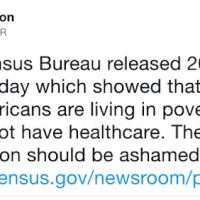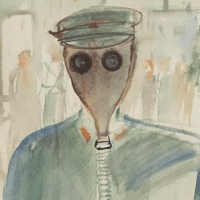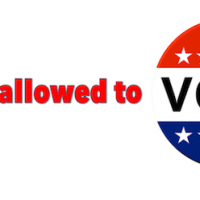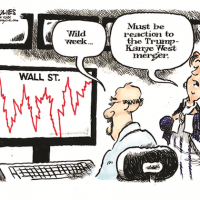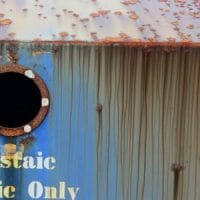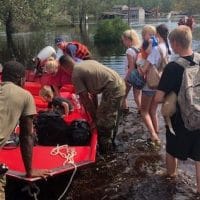-
Why are thousands of Hondurans walking towards the U.S. border?
The migrant caravan, which has been met with threats from Donald Trump, is the result of poverty, growing crime and repression in Honduras. The U.S. has played a key role in propping up the government of Juan Orlando Hernández, who was reelected in November through blatant electoral fraud.
-
How can we make “Abolish ICE” a reality?
Two of the immigrant rights movement’s historic demands provide a basis for actually closing the agency, and beyond that for building a movement to demand more fundamental changes.
-
Sciences of inequality
Last month, Philip Alston, the United Nations Special Rapporteur on extreme poverty and human rights (whose important work I have written about before), issued a tweet about the new poverty and healthcare numbers in the United States along with a challenge to the administration of Donald Trump (which in June decided to voluntarily remove itself from membership in the United Nations Human Rights Council after Alston issued a report on his 2017 mission to the United States).
-
Women workers bring Glasgow to a standstill
Council staff make history with biggest strike over equal pay.
-
Privatisation harms poor and needy, says UN poverty expert
Widespread privatisation of public goods in many societies is systematically eliminating human rights protections and further marginalising those living in poverty, according to a hard-hitting new report. The report was transmitted to the UN General Assembly on 19 October.
-
The new undesirables
Sivamohan Valluvan and Eleanor Penny unpack neoliberal attitudes to migration and ‘low-value’ humans.
-
Trump Says U.S. to exit nuclear treaty, Russia vows retaliation
Trump said the United States will develop the weapons unless Russia and China agree to a halt on development.
-
The monstrous anger of the guns
‘We are losing the fight against famine’, said the UN’s Under-Secretary General for Humanitarian Affairs and Emergency Relief Coordinator Mark Lowcock to the UN Security Council on 21 September. He was talking about Yemen, which has been bombarded by the monstrous anger of the Saudi-Emirati guns from March 2015.
-
November elections and the art of voter suppression
Voting rights violations are emerging across several states with less than a month before the conclusion of midterm elections in the United States.
-
Confronting Climate Change in a deeply unequal world
The global reaction to two landmark new reports suggests the world could well lose that confrontation.
-
Goosing the corporate goose
No, the stock market is not predictable. And no one knows the exact causes of last week’s carnage on Wall Street—with the Dow down 4.2 percent, the S&P 4.1 percent and the Nasdaq 3.7 percent, representing their worst weekly performances since March.
-
Plastics and fossil fuels
Follow the History of Technological Systems.
-
The U.S. medical system: healthy profits at people’s expense
The health-care industry overtook the retail sector as the nation’s largest employer in December, giving local economies and their workers a stake in the industry’s growth. Health jobs surpassed manufacturing jobs in 2008.
-
Bolsanaro supporters carve swastika into woman
GROUP of men claiming to be supporters of far-right Brazilian presidential candidate Jair Bolsonaro carried out a sickening physical attack on an opposition supporter this week, carving a swastika into her stomach with a knife.
-
The color of economic anxiety
Is the collapse of Democratic fortunes due to economic anxiety? Of course. Just ask black Milwaukeeans.
-
Black Lives Matter activists hail ‘historic’ verdict as killer of Laquan McDonald convicted of murder
“In Chicago instead of funding healthcare, the things we need, we have been divested from. And that’s part of a neoliberal project that’s been hegemonic since the 1970s… capitalism sets the conditions for everything that’s happened.”
-
The coming military vision of state censorship
A key meeting of cabinet members from the U.S.-led Five Eyes (UK, U.S., Aus, Can, NZ) global spying network was held in Australia in late August, which went totally unreported by the mainstream media, mainly because Britain’s representative used the cloak of Brexit to disguise it, ironically via social media.
-
Mexican farmers accuse Volkswagen “Hail Cannons” of causing drought as climate catastrophes and weather engineering proliferate
In this MPN exclusive, we spoke to Zapatista Indigenous Autonomous Movement organizer Alfredo Lozano Ortega and Monthly Review editor John Bellamy Foster about the corporate abuse of weather modifying technology and the ecological damage it produces.
-
The ‘Christine Lagarde Memo’
This secret memo was discovered in the waste basket of a high-ranking staffer in the European Commission. The memo from “the Coalition” begins “Dear Angela, Teresa, Emmanuel…” and has a further list of first names—heads of state and secretaries or ministers of finance, health and human services—were mostly scribbled over with marker.
-
Seven things you should know about the IPCC 1.5°C Special Report and its Policy implications
The Intergovernmental Panel on Climate Change (IPCC) is soon going to release an important report to help inform global efforts to limit climate change. The special report details the impacts of a global average temperature increase of 1.5°C relative to 2°C above pre-industrial levels, and pathways to limit temperature increase to that level.



